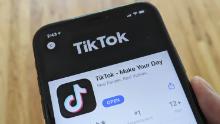Trump is stealing China’s playbook to deal with TikTok

ByteDance would itself hold zero percent of the new entity, a person familiar with the deal told CNN Business earlier this week. Instead, TikTok Global would be partially owned by ByteDance’s international and Chinese investors.
The agreement would make Oracle TikTok’s “trusted technology partner,” and give the California-based tech firm the ability to store the app’s American user data and review its source code.
For American companies that work in China, the broad strokes of this deal might seem familiar. Beijing often forces foreign businesses to form joint ventures with local firms and establish offshoot entities.
“I think there is some era of retaliation here, where, ‘Hey, if you’re going to do this to our companies — shut us out or force us to localize — then we’re going to do it to you as well,'” said Dipayan Ghosh, the co-director of the Digital Platforms and Democracy Project at the Harvard Kennedy School.
More similar to China than Europe
Trump’s threat to ban TikTok if the app is not sold to a US company is founded on the fear that otherwise, American user data risks winding up in the hands of the Chinese government. (Tiktok has denied this as a possibility and says it keeps US data stateside, with a backup in Singapore.)
Now that the United States has been forced to reckon with a foreign company that has broad access to US user data, though, the country is taking an approach that resembles China’s far more than it does Europe’s.
The steps taken by other US firms that have access to Chinese user data bear resemblance to the TikTok proposal in other ways. Apple’s iCloud services in mainland China are operated by a Chinese company, for example. The Silicon Valley firm was forced to do so to comply with the country’s cybersecurity rules, which require companies to store data on Chinese users domestically.
“The US is copying what the Chinese have done,” said James Lewis, a senior vice president at the Center for Strategic and International Studies, a think tank based in Washington, D.C. “Trump is taking a nationalistic approach.”
A nationalistic America
That way of doing things has consequences, though.
“The US was always about the international system and following the rules,” Lewis said. “A more nationalistic America is harder for everyone, not just the Chinese.”
“What worries me is that the US is becoming China by trying to block off apps,” said Susan Ariel Aaronson, a professor at George Washington University, where she directs a digital trade and data governance hub. “We too are censoring; we too are intervening in the markets for data.”
Many experts have pointed out that the United States has legitimate concerns when it comes to safeguarding the data of American citizens. Instead of singling out Chinese companies, though, they say the United States should develop universal standards for data collection and use.
Ghosh, for example, said a European approach, like a US version of GDPR, may be the right way forward.
Whatever Washington decides, though, the country’s actions are likely to set a powerful precedent. Take India, for example, which has already banned a bunch of Chinese apps during a broader geopolitical tussle.
“If we continue to play the game of whack-a-mole with Chinese apps that are perceived as a threat, I don’t think that makes us anymore secure,” said Samm Sacks, a fellow at the Washington, D.C.-based think tank New America who studies cybersecurity and US-China relations.
“I think that what that does is it creates a ripple effect, where other countries around the world will say, ‘This is a blueprint on how to block a powerful technology company under the guise of national security.'”











